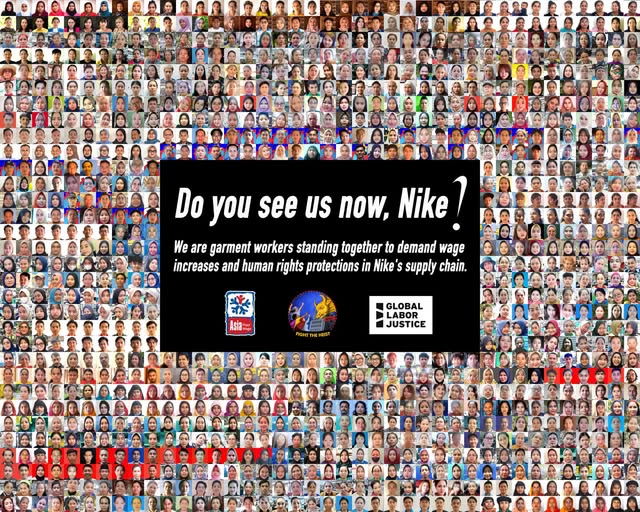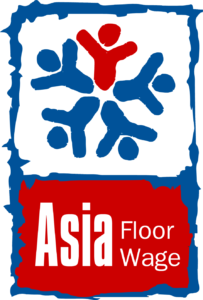#SeeUsNike: Garment Workers Risk Going Public, Demanding Wage Justice

As over 1,000 of Workers Launch Photo Petition; Global Allies Hold an Online Day of Action
More than 1,000 garment workers from South and Southeast Asia are taking an unprecedented step: going public with their faces in a photo petition to Nike — despite the risk of retaliation — demanding that the company raise wages and uphold human rights in its supply chain. This bold collective action is part of “Fight the Heist,” a global campaign calling on the world’s wealthiest fashion brands to stop profiting from exploitation and start respecting the rights of their workers.
As part of the “Fight the Heist” campaign, over 1,000 union garment workers from South and Southeast Asia are sending Nike a photo petition demanding wage increases, human rights protections and an end to wage theft in its supply chain.
Nike spends billions annually on high-profile sponsorships, bold marketing campaigns, and celebrity endorsements. In February alone, Nike unveiled its new slogan — “So Win” — in a Super Bowl advertisement and launched NikeSKIMS, a partnership with Kim Kardashian’s SKIMS, both seemingly celebrating the power of women.
But behind the glossy advertisements purporting to support women’s equality and empowerment, Nike’s business model and profits depend upon over a million garment workers, mostly women, who work for as little as $100 per month creating Nike’s shoes and clothing. During the COVID-19 pandemic, these workers experienced a human rights crisis triggered by massive wage losses while Nike reported record profits in 2021. With the support of their unions, Asia Floor Wage Alliance and Global Labor Justice, a growing group of worker activists are standing up to demand a change.
“So many of us have been silent because we’re afraid of getting fired,” said Siti Nursyafitri, who makes Nike shoes in Indonesia and is a member of Serikat Nasional Pekerja (SPN). “But now together, across many countries and with over a thousand of our sisters, we are ready to show our faces.”
“Nike designed its supply chain to keep workers separate and limit their collective power,” said Wiranta Ginting, Deputy International Coordinator of Asia Floor Wage Alliance. “Today is a turning point for garment worker unions in Asia as they come together across the region and as workers break through their fear.”
Garment workers from Indonesia, Cambodia, Sri Lanka, Bangladesh, India, and Pakistan have been organizing in their factories and across borders with three major demands for Nike:
- Ensure wage increases for supply chain workers.
- Make an agreement with workers and their unions to protect the labor and human rights of workers in its supply chain.
- Create a mechanism to immediately address future crises, wage theft and labor rights violations.
“Today in Sri Lanka many of the workers making Nike products earn as little as $100 USD per month,” said Swasthika Arulingam, President of the Commercial and Industrial Workers Union (CIWU) in Sri Lanka. “That is not enough to buy a pair of Nike sneakers and certainly not enough to meet the needs of a family.”
As workers show their petition to Nike and the public for the first time, it will be amplified by allies across the world, including the AFL-CIO, American Federation of Teachers, Unite Here, Communications Workers of America, Oregon Education Association, Massachusetts Teachers Association, the Graduate Teaching Fellows Federation at the University of Oregon, Jobs with Justice, Model Alliance, and many more. In addition, Labour Start, a labor digital campaign organization, has coordinated activists around the world to send the petition to members of Nike’s board.
“The fight for fully-funded public schools in Oregon is deeply linked to the fight of garment workers, as corporations like Nike make billions on the backs of workers and at the expense of communities and families,” said Laura Latham, a middle school teacher and member of the Oregon Education Association.
A growing regional committee of worker activists created a video message to Nike. Support has also grown from U.S. labor, including actions in 8 cities across the U.S. in July coordinated by the Coalition of Labor Union Women and CWA.
The Fight the Heist worker activist committee is growing and meeting virtually with allies. As these workers increase their visibility and support, they believe this March Madness season is the perfect time to start the discussion about the hypocrisy of the Nike “swoosh” – a symbol of women’s empowerment in sports and the exploitation of women in factories across the world.
“Support is growing for this bold fight by garment supply chain workers, especially across the U.S. labor and social movements,” said Jennifer (JJ) Rosenbaum, Executive Director of Global Labor Justice. “As women workers take the risk and come out of the shadows, they have inspired powerful allies to join with them in their demands for labor and gender justice.”
In 2023, Asia Floor Wage Alliance and Global Labor Justice launched the Fight the Heist campaign together with 25 garment worker unions from India, Indonesia, Pakistan, Sri Lanka, Cambodia and Bangladesh. After Asian garment workers, who are mostly women and internal migrants, faced an unprecedented human rights crisis as their wages and hours were slashed during the COVID pandemic, they have decided to speak up and fight back as never before. The campaign has focused on U.S. fashion brands, and particularly Nike, which announced record profits and $18 billion in stock buybacks in 2022 as workers remained in debt and unable to meet basic needs.
Global Labor Justice (GLJ) is a non-governmental organization that works transnationally to advance policies and laws that protect decent work; strengthen freedom of association and workers’ ability to advocate for their rights; and hold corporations accountable for labor rights violations in their supply chains.
Asia Floor Wage Alliance (AFWA) is an Asian labor-led global alliance of labor and social movement organizations for addressing poverty-level wages, gender discrimination, and freedom of association in global garment production networks.
